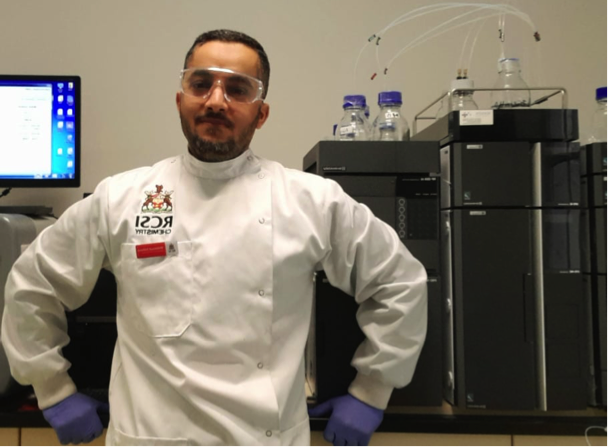Sweet Nanoparticles Could Help Improving Cancer Targeting
To explore the impact of sweet nanoparticles (particles coated with carbohydrate) on their path towards clinical translation.
Dr Mahmoud Soliman is an alumni MSCA Fellow and postdoctoral researcher in the Department of Chemistry at the RCSI University of Medicine and Health Sciences. Here he describes his MSCA Individual Fellowship project, which he is carrying out under the supervisor of Dr Marco Monopoli.
Background
‘Cancer is a silent killer’
Cancer is one of the most common causes of death worldwide. According to recent statistics from “Cancer Statistics, 2021”, more than 1.5 million people will be diagnosed with cancer in the USA in 2021; of these, more than 0.5 million are expected to die. Over the next few years, the number of cancer cases and deaths are expected to increase worldwide. This is due to i) the growth of the aging of the population, ii) an increase in the number of people with unhealthy lifestyles, especially in developing countries, and iii) the lack of effective approaches to treating cancer.
‘Current cancer therapy doesn’t always work’
According to the American Cancer Society, the disadvantage of the use of chemical agents to treat cancer (chemotherapy) is that they do not distinguish between cancer and non-cancer cells. Consequently, treatment is too often unsuccessful, and comes with many side effects, including hair loss and damage to the liver, kidneys, and bone marrow. This leads to poor quality of life for patients and increases the burden on society (patients and their families).
‘Nanomedicine is a promising field’
Treatments based on nanotechnology (nanomedicine) offer new opportunities for cancer diagnosis and treatment. Nanoparticles (small particles with a size typically between 3-100 nanometres) can be designed to have different chemical and architectural properties, which allow them to be directly injected into the tumour (if the tumour is accessible) or injected, in combination with antibodies that selectively target cancer cells, near the tumour. A major advantage of using nanoparticles is that they can escape the leaky tumour blood vessels (there are gaps in the walls of tumours blood vessels) and accumulate around tumours. This makes them more efficient in killing cancer cells.
‘Protein corona leads the nanoparticle-cell interaction’
Although large numbers of nanoparticles are already in clinical use (Abraxane, DaunoXome, Onivyde), less than 1% of the administered nanoparticles can reach the tumour site (Wilhelm, S., et al). Researchers think that this is due to the complexity of the physiological environment. Our bodies contain thousands of biomolecules, including proteins, lipids, and sugars. Some of these biomolecules can coat the surface of nanoparticles, forming a layer called a ‘protein corona' (not related to the Coronavirus). Researchers believe that this can affect their biological fate/therapeutic effect. For example, the protein corona might lead to the nanoparticles being identified as waste projects, resulting in them being rapidly cleared from the body. Therefore, decoration of the nanoparticles’ surface with molecules that can reduce or control the protein corona formation would be valuable.
‘New nano-weapon using sweet nanoparticles’
Glycans are biomolecules made of carbohydrate units. They attach to almost all proteins in a process called glycosylation. Glycosylation is essential for the development of living organisms as it contributes to many key biological processes, including cell-to-cell communication, cell adhesion, molecular trafficking and clearance, receptor activation, and the uptake of substances into cells. Once important sialic acid glycan, N-acetylneuraminic acid (NeuAc), can directly interact with the sialic acid-binding-like lectin (Siglec) present in on immune cells, resulting in a reduction of the immune response. Thus, we believe that glycans have exploitable properties that make them unique candidates to employ in the field of nanotechnology and nanomedicine.
Study objective
With my two-year MSCA Individual Fellowship project (I started in September 2020), I aim to synthesize new types of gold nanoparticles and functionalize them with a biocompatible and immuno-silent glycan (sialic acid glycans). This should increase the nanoparticles’ ability to stay suspended in a solution (making them easier to inject into patients), regulate protein corona formation, allow them to evade the immune response, and enhance their targeting efficiency and cellular uptake.
Study design
I have developed a method to synthesis metallic nanoparticles with a universal surface coating. I then used this as a platform to achieve a controllable decoration of glycans on the top of nanoparticles. I characterised the resulting sweet nanoparticles, and tested their target ability to bind, or attach, to a lectin from sambucus nigra (SNA; a protein that specifically binds to sialic acids) in free and protein-rich media. The latter is particularly important and is it replicates the environment in which cells live. After that, I explored the ability of the sweet nanoparticles to attenuate the protein corona using different biological matrices and escape from macrophages recognition (cellular uptake study).
Study results
The results indicate a high quality of prepared sweet nanoparticles that can bind to SNA in free and more importantly in protein-rich media. This is the first step to achieving my goal of creating nanoparticles that can be targeted directly to the cells where they are most needed while avoiding phagocytosis by macrophage-like cells. The latter was successfully achieved through intensive experiments on different types of cells through cytotoxicity and cellular uptake studies.
Project outcome
The results of the project open the way toward the design of efficient therapeutic/diagnostic glycan-decorated nanoparticles for specific biological applications.
New nano-weapon using glyco- nanoparticles for targeting cancer cells
Dr Mahmoud Soliman
Mahmoud Soliman is a postdoctoral researcher in the Chemistry Department at the RCSI University of Medicine and Health Sciences, where he was successfully awarded the MSCA IF in 2020. His research focuses on synthesis and surface engineering of inorganic nanoparticles for therapeutic applications. Before moving to RSCI (Dublin/Ireland), he received his Ph.D. in natural science from the Philipps University of Marburg in Germany. He also worked as a postdoc researcher associate at Marburg University in Germany and Liverpool University in the UK.
Follow Mahmoud on:


